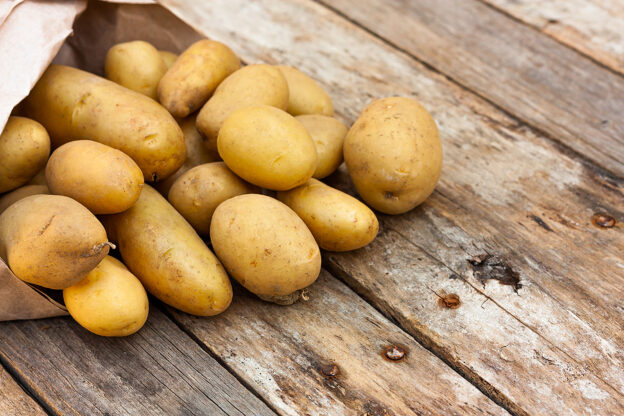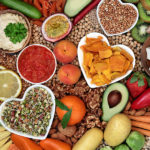By David Blyweiss, M.D., Advanced Natural Wellness
November 1, 2021
In the October 27th issue of Advanced Natural Wellness, you learned what physical inactivity does to your body. Today, I want to share some major misconceptions about food and your body weight.
We spend a lot of time talking about portion size. Calories in, calories out. But if you’re experiencing weight issues, it might be more about what you’re eating than how much of it you’re eating.
There are certain carbohydrate foods that may be leading the obesity crisis. They disrupt your metabolic balance and mess with the way your body stores fat.
They cause your body to release high levels of insulin which, in turn, tells your body to store more calories in the fat cells. At the same time, these foods suppress glucagon, the hormone that tells your body to burn calories.
So your fat cells get locked up.
Your body is tricked into thinking it doesn’t have enough energy to function properly. Instead, it thinks you need more calories, not less. This, in turn, slows down metabolism and makes you feel hungrier, even though you’ve had plenty to eat.
It ends up being a vicious cycle that continually adds to your fat stores. And until you break the cycle, getting rid of excess weight will be nearly impossible.
MD Exposes the Hidden Danger to Your Eyes

When your eyesight starts to fail, it's a real problem. Suddenly you can't go to the grocery store... you can't get to the doctor if you have an emergency... you can't meet your friends for dinner…
Your "regular" doctor doesn't have time to keep up with the latest research. And the same goes for eye doctors. They go to school to learn how to fit you for glasses and contacts, but have no way of preventing the damage and loss of eyesight that threatens your freedom and independence.
Let me show you something that explains a LOT about how your eyes work.
In my FREE Special Report, I'll show you a HUGE, untapped resource for your eyes that safely and naturally restores clear, effortless eyesight.
Click here to get started...
Quantity vs. Quality
Instead of our main focus being on the quantity of calories consumed, it should be the quality of the calories.
Since the 1970’s, when we entered the “low-fat era”, we’ve been eating more low-quality carbs every year. So we’re getting a lot more calories from carbohydrates than we used to. They are mostly high glycemic carbs from added sugars, refined foods and potato products. And obesity rates have risen in direct relation to this higher carbohydrate intake.
During this same period, people started ditching anything that contained “fat” – including the good fats!
For example, instead of choosing a fresh avocado that’s about 240 calories with 21 grams of fat, people started eating things that sounded low-fat and healthy. Let’s say they picked a protein bar with 200 calories and 11 grams of fat instead of the avocado.
But which one is going to be better for your metabolism? Which one is going to promote weight loss? The higher calorie, higher fat avocado? Or the protein bar with added sugars, corn syrup, corn starch, rice starch and fructose in it?
You know the answer, right? It’s the avocado.
We’ve seen, over and over again, that people achieve greater weight loss by eating a diet low in high glycemic carbohydrates than they do from low-fat diets or calorie-restricted diets.
And this makes a lot of sense.
What you have to consider is how foods affect your body. What you eat influences your hormones, metabolism, gene expression and gut microbiome. When these physiological pathways are thrown out of balance, it affects the way your body stores fat.
Unlock Your Fat Cells
Are You Suffering From...
- Love handles and a pot belly
- Romance that isn't what it used to
- Forgetfulness and inattention
- Low (or no) strength and endurance
- A sex drive that's shifted into neutral...or worse
If so...you may have Mature Male Burnout. Click here to discover more about this unique condition and what you can do about it.
Our origins lie in a hunter-gathering lifestyle. We lived off the land, and we need to get back to that way of thinking.
I’m not saying you need to raise your own food, just that you need to eat more natural, wholesome foods.
Bypass all of those aisles at the store filled with refined and processed foods that come in cans, boxes or in the frozen food section. Those are the foods that will increase your insulin and lock up your fat cells.
Instead, go straight to the produce department. That’s where you’ll find 85% of the food you should be eating. I’m talking about organic plant-based foods from all colors of the rainbow.
Most of them have low to moderate glycemic loads. You’ve got your veggies, fruits, beans, nuts and seeds. A few that you want to eat in moderation due to a higher glycemic load include white potatoes, sweet potatoes, green peas, raisins, over-ripe bananas, pineapple and watermelon.
Instead of rice or potatoes, use beans as a side dish. Trade in your chips for nuts, and your soft drinks for water or green tea. Replace high glycemic grain products with those that are friendlier to your metabolism and waistline. Buckwheat, bulgur and quinoa come to mind.
Fill in the remaining 15% of your diet with lean, grass-fed beef, wild-caught fish and pastured poultry.
And please! Don’t avoid foods that are high in healthy fats!
I mentioned avocadoes above. Even though they’re “fatty,” it’s good fat that actually encourages weight loss. Eating just half of an avocado with your lunch can improve insulin response and lower your blood sugar. These are two of the biggest factors when it comes to storing – or not storing – fat.
Extra virgin olive oil is another high fat food. But again, it’s a good fat that helps reduce body fat, not add to it.
Nuts are often a food that dieters avoid because they’re high in fat and calories. But they don’t affect your insulin or lock up your fat cells. Thus, people who eat more nuts tend to lose both body weight and body fat.
With plenty of physical activity and the right foods, you can start unlocking those fat cells immediately.
Stay tuned, and I’ll share the final key to what’s fattening Americans up – and what you can do about it – in the November 5th issue of Advanced Natural Wellness.
SOURCES:
Ludwig DS, Ebbeling CB. The Carbohydrate-Insulin Model of Obesity: Beyond “Calories In, Calories Out”. JAMA Intern Med. 2018;178(8):1098-1103.
Ludwig DS, Aronne LJ, Astrup A, de Cabo R, Cantley LC, Friedman MI, Heymsfield SB, Johnson JD, King JC, Krauss RM, Lieberman DE, Taubes G, Volek JS, Westman EC, Willett WC, Yancy WS, Ebbeling CB. The carbohydrate-insulin model: a physiological perspective on the obesity pandemic. Am J Clin Nutr. 2021 Sep 13:nqab270.
Manninen AH. Is a calorie really a calorie? Metabolic advantage of low-carbohydrate diets. J Int Soc Sports Nutr. 2004;1(2):21-26.
Feinman RD, Fine EJ. “A calorie is a calorie” violates the second law of thermodynamics. Nutr J. 2004 Jul 28;3:9. doi: 10.1186/1475-2891-3-9.
Wien M, Haddad E, Oda K, Sabaté J. A randomized 3×3 crossover study to evaluate the effect of Hass avocado intake on post-ingestive satiety, glucose and insulin levels, and subsequent energy intake in overweight adults. Nutr J. 2013 Nov 27;12:155.
Nishi SK, Viguiliouk E, Blanco Mejia S, Kendall CWC, Bazinet RP, Hanley AJ, Comelli EM, Salas Salvadó J, Jenkins DJA, Sievenpiper JL. Are fatty nuts a weighty concern? A systematic review and meta-analysis and dose-response meta-regression of prospective cohorts and randomized controlled trials. Obes Rev. 2021 Nov;22(11):e13330.
Galvão Cândido F, Xavier Valente F, da Silva LE, Gonçalves Leão Coelho O, Gouveia Peluzio MDC, Gonçalves Alfenas RC. Consumption of extra virgin olive oil improves body composition and blood pressure in women with excess body fat: a randomized, double-blinded, placebo-controlled clinical trial. Eur J Nutr. 2018 Oct;57(7):2445-2455.







